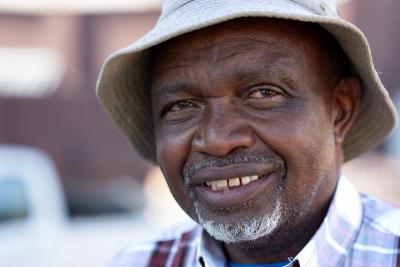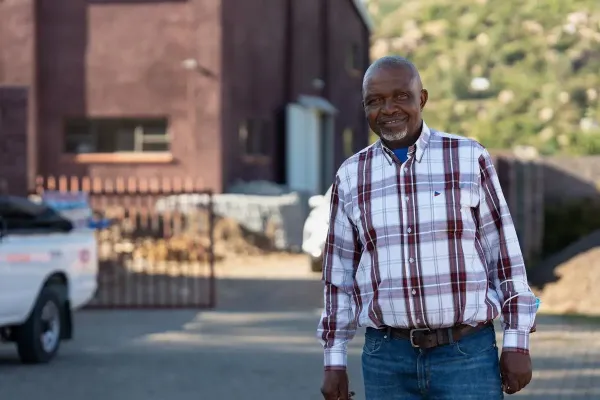Partners In Health (PIH)-supported Botšabelo Hospital looked vastly different when Paul Soko began working there in 2010. The roads throughout the campus were gravel with minimal landscaping. And the warehouse and retaining wall weren’t built yet.
Upon being hired as a clerk of works assistant, Soko immediately began envisioning ways to make the buildings and grounds more attractive, healthier, and easier to access. For nearly 15 years, he dedicated his career to achieving that.
Today, it’s difficult to point out a structure on campus that Soko wasn’t involved with in some way.
He oversaw the team who built the warehouse, a massive building that stores food and other lifesaving necessities for patients with tuberculosis. He helped construct the hospital’s oxygen plant and dug a trench to bring piped oxygen to bedsides. He designed and laid hundreds of pavers, causing less dirt and debris in the air and making the road more accessible for wheelchairs and vehicles. He planted flowers and trees to make the atmosphere more welcoming. The list goes on.
“In my opinion, the surroundings can heal a sick person,” says Soko, PIH Lesotho’s infrastructure and maintenance coordinator.
At PIH, we believe the surroundings—or “space”—are one of the five essential elements for strong health systems. By renovating existing facilities and building others from the ground up, PIH creates spaces to meet clinicans’ needs and provide a healing environment for sick patients across the 11 sites where we work.
Since 2010, Soko has played a key role in improving Botšabelo Hospital as well as PIH Lesotho’s seven Rural Health Initiative (RI) sites located in the most remote areas of the mountainous country. He supervised maintenance staff at all RI sites and addressed any needs, such as roof repairs and electrical issues.
“Whenever they have a problem, they call me,” says Soko. “I’m happy all the staff understand the importance of saving lives. If people at RI sites are happy, it’s going to be easy for them to do their job well.”
Always Helping
Mary Lesesa, PIH Lesotho nurse-in-charge and program manager, first met Soko while working at Nohana, an RI site, in 2010. Soko would stay at the hard-to-reach clinic for days at a time to address maintenance problems.
“He’s very helpful and very ready to assist, even if something is beyond his scope,” says Lesesa.
Back then, Soko would often express his ideas to Lesesa. She says he’d always eventually make them a reality. Reflecting on their long time working together, Lesesa is most impressed by one of his recent projects outside of the intensive care unit (ICU) building, which opened at Botšabelo Hospital in 2023.
“He designed the picnicking area, the flowers, the trees,” says Lesesa. “It was wonderful because I wanted those trees, but I didn’t say anything to him. He just volunteered. The place is very nice.”

Paul Soko on the campus of PIH-supported Botšabelo Hospital in Maseru, Lesotho in April 2024.
Caitlin Kleiboer / Partners In Health.
Soko’s Next Chapter
Soko’s last day at PIH Lesotho was on August 30. He’s transitioning into retirement due to the country’s law regarding mandatory retirement age.
“It’s so unfortunate I have to leave, but at the same time I’m so interested [in] helping our fellow countrymen and to improve their lives as well. I am interested in farming and I want to help those people as much as I can,” says Soko.
He plans to dedicate his time to supporting his son and two brothers with their farming business. They aim to plant 120,000 apple and peach trees. While those are growing, they’ll plant cabbage and other vegetables.
A seemingly lofty goal for four people, Soko notes his objective is to expand their operation and ultimately create jobs in Lesotho, where there is a 16.4% unemployment rate.
“You don’t have to keep people suffering,” he emphasizes as he reflects on PIH patients and more broadly, the people of Lesotho.



